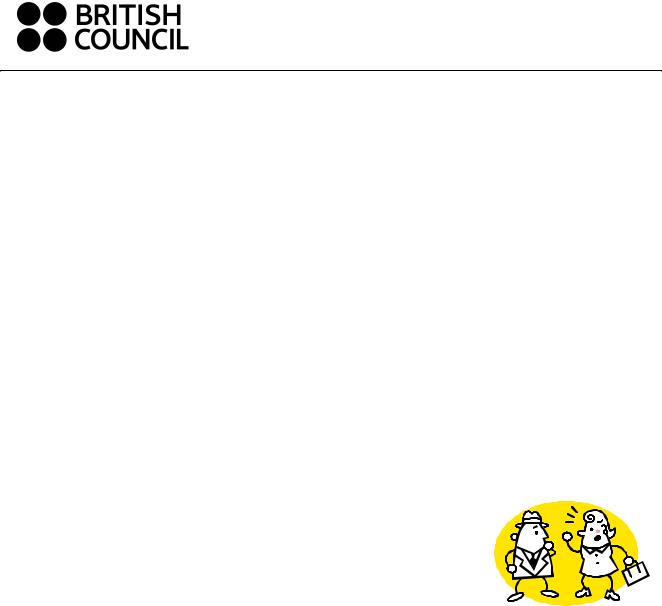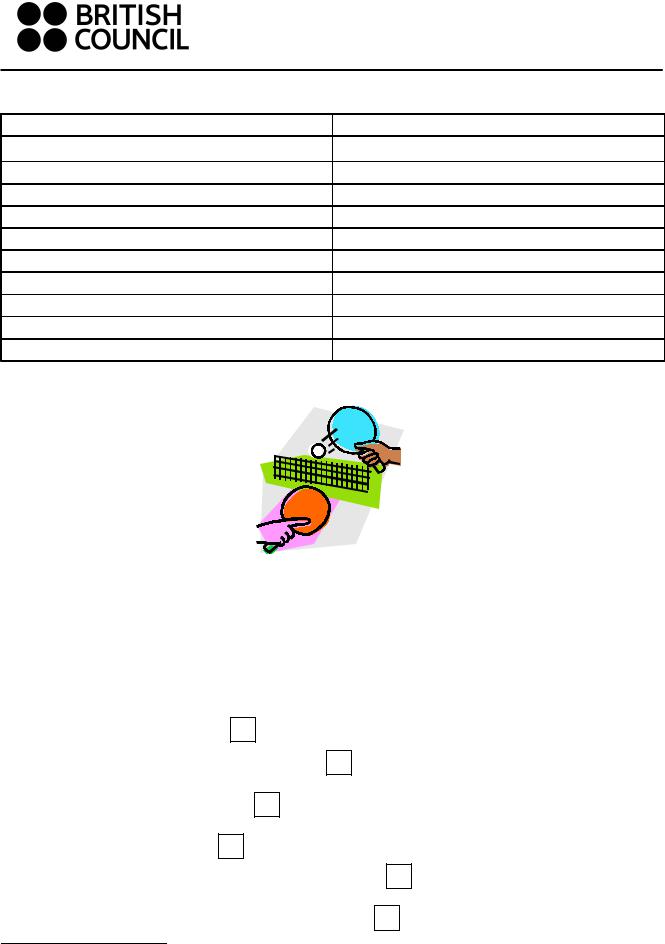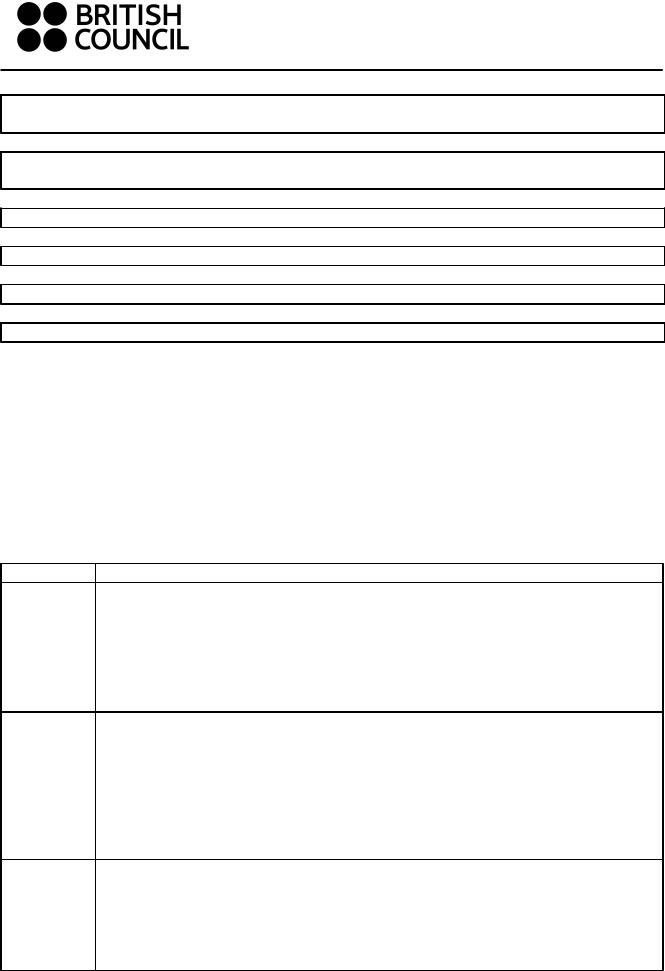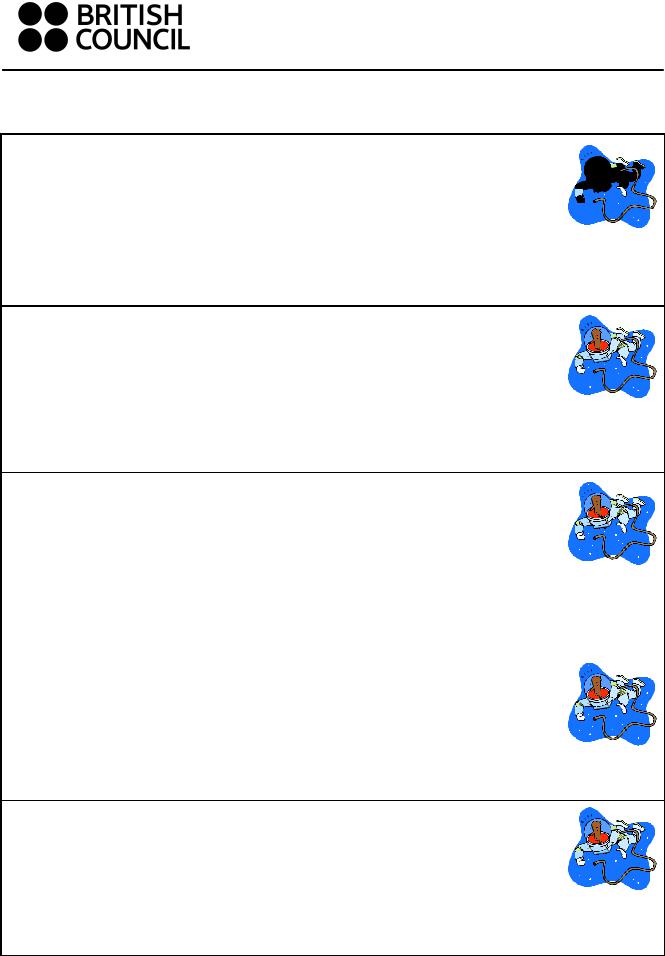
short_stories_2009-10
.pdf
EDB Language Arts
Professional Development for Teachers
Learning English through Short Stories
∙Now pass your paper to another pair. Tell the other pair your names and who was A and who was B.
∙Each pair can make the dialogue more ‘dramatic’ by adding reporting verbs and descriptions to their friends’ dialogues.
For example:
A:Hey. What are you doing after school?
B:Playing football with my friends.
“Hey. What are you doing after school?” whispered Janice.
“Playing football with my friends” replied Eason looking worried.
Then hand back the dialogue for the speakers to read. (This can be done with language input targeted at the proficiency of your students)
3Expressing meaning
a) What do you notice about the dialogue extract from a story below? (Hint: look at the reporting verbs)
“Did you see that?” said May.
“Yes, what on earth was it?” said Michael. “I think it was a UFO” said May.
“Are you sure?” said Michael.
“No but I don’t want to stay here to find out” said May. “You’re right. Let’s get out of here!” said Michael.
To make a dialogue more interesting, writers often use verbs and adverbs to show how somebody is feeling or behaving. Match the verbs below with an action or feeling (some may have more than one possible answer). One answer has been done for you. These example sentences might also help you.
Examples:
∙“Please, please, please can I have an ice-cream Mummy?” begged little Billy.
∙“How many more people can squeeze into this lift?” wondered Candy.
∙“I’ve got so much homework to finish this weekend” sighed the student.
∙“I got an A in my chemistry exam!” laughed Wing.
∙“Did you hear what happened to those naughty students?” whispered Calvin.
∙“Sit down and get on with your work immediately!” shouted the headmaster.
∙“Help! There’s a big spider under my chair” screamed Andy.
∙“Have you got a ticket, Sir?” enquired the bus driver.
∙“Can you open the door for me please?” asked the old lady.
∙“Nobody loves me” cried the ugly duckling.
51
© The British Council
The United Kingdom’s international organisation for educational opportunities and cultural relations. We are registered in England as a charity.

EDB Language Arts
Professional Development for Teachers
Learning English through Short Stories
Verb |
|
This person… |
a. shouted |
7 |
1. feels happy |
b. whispered |
|
2. wants to get an answer |
c. screamed |
|
3. is sharing a secret |
d. begged |
|
4. is feeling tired and fed-up |
e. enquired |
|
5. is not sure about something |
f. laughed |
|
6. needs some help |
g. sighed |
|
7. is angry |
h. wondered |
|
8. may be frightened |
i. cried |
|
9. really wants something |
j. asked |
|
10. feels sad |
b) The dialogue between May and Michael above could be called a ‘ping pong’ dialogue2 as it goes back and forth between the two characters like a ping pong ball and there is no description or scene-setting to add to the atmosphere. This kind of dialogue is quite tiring for the reader.
Add the descriptions and details from the next page to suitable places in the dialogue. Write the numbers in the boxes to show where you would add a description or detail.
“Did you see that?” yelled May
“Yes, what on earth was it?” asked Michael
“I think it was a UFO” replied May
“Are you sure?” said Michael
“No but I don’t want to stay here to find out” said May
“You’re right. Let’s get out of here!” agreed Michael
2 The term ‘ping-pong dialogue’ comes from http://www.ket.org/education/guides/pd/teachingtheshortstory.pdf
52
© The British Council
The United Kingdom’s international organisation for educational opportunities and cultural relations. We are registered in England as a charity.

EDB Language Arts
Professional Development for Teachers
Learning English through Short Stories
staring with wide eyes at the night sky. The park was usually brightly lit and full of people but
tonight it was strangely silent. |
1 |
looking at her in surprise. May had some crazy ideas |
|
but he thought she could be right this time. |
2 |
as she grabbed hold of Michael’s arm tightly. |
3 |
glancing nervously over his shoulder as they ran. |
4 |
in a shaky voice. |
5 |
and she began to run pulling him towards the steps. |
6 |
Dialogue can tell your reader more about the characters. Read the extracts on pages 10 -
11; 21 - 22 and 45 - 47 from ‘The Space Invaders’.
What can you say about the characters? Write the words and phrases which helped you to decide. Some examples have been done for you and here are some helpful hints:
Hint 1: Look at the reporting verbs for each character. Hint 2: What do other people say about the character?
Hint 3: Look at any descriptions of how the character speaks or behaves.
Name: |
Character description: |
Miranda |
She isn’t friendly. These words show this: “She said each word sharply and |
|
coldly” (page 10). |
Garth |
He is bossy. I guessed this from the words “Omega, I order you…” and |
|
shouted Garth (page 21). |
Omega |
He is a kind of machine. The words that tell us this are: “Mistakes are made by |
|
|
humans. I do not make mistakes” (page 10) and “Omega was now part of the |
|
|
controls of the spaceship” (page 21) |
|
53
© The British Council
The United Kingdom’s international organisation for educational opportunities and cultural relations. We are registered in England as a charity.

EDB Language Arts
Professional Development for Teachers
Learning English through Short Stories
APPEARANCE
|
CHARACTER |
|
_________ |
MANNERISMS |
PERSONALITY |
(BEHAVIOUR) |
TRAITS |
Fast finishers now develop a mind map and create a fuller picture of their characters
4Creating a dialogue
a) Work with another student and choose a card from the envelope marked ‘Conflict Cards’. Use the situation to write a short dialogue between the characters you explored in the previous task.
∙First, write their conversation below (you can role-play it if you want to):
Character 1: “______________________________________________________________“
Character 2: “______________________________________________________________“
Character “______________________________________________________________“
Character : “______________________________________________________________“
Character : “______________________________________________________________“
Character : “______________________________________________________________“
Character : “______________________________________________________________“
Character : “______________________________________________________________“
Character : “______________________________________________________________“
Character : “______________________________________________________________“
Etc:
54
© The British Council
The United Kingdom’s international organisation for educational opportunities and cultural relations. We are registered in England as a charity.

EDB Language Arts
Professional Development for Teachers
Learning English through Short Stories
∙Now write the conversation as a full dialogue, using reporting verbs and descriptions so that readers get an idea of the character. Produce this on a new piece of paper to show to the class later.
Things to check:
Have you…
∙used a range of reporting verbs?
∙included descriptions and details so it’s not a ping-pong dialogue?
∙given the reader some clues about the character through the dialogue?
55
© The British Council
The United Kingdom’s international organisation for educational opportunities and cultural relations. We are registered in England as a charity.

EDB Language Arts
Professional Development for Teachers
Learning English through Short Stories
CONFLICT CARDS
Who? Garth 




 Where? (You decide)
Where? (You decide) 


 What? Is about to do something bad (You decide what) Why? (You decide)
What? Is about to do something bad (You decide what) Why? (You decide)
Who? Everyone Where? (You decide)
What? You need to get back to safety
Why? Someone is injured (what happened?)
Who? |
Miranda & Garth |
Where? (You decide) |
|
What? |
One character wants to go home (who?) |
Why? |
and the other one wants to continue the adventure. |
(You decide) |
|
|
|
Who? |
(You decide) |
Where? (You decide) |
|
What? |
They are suddenly caught in a huge storm |
Why? |
Someone didn’t check the weather report (who?) |
Who? Omega & Miranda Where? Inside the space ship
What? Omega realises Miranda is planning to steal something (you decide what)
Why? (You decide)
56
© The British Council
The United Kingdom’s international organisation for educational opportunities and cultural relations. We are registered in England as a charity.

EDB Language Arts Professional Development for Teachers Learning English through Short Stories
Activity 5 |
Storytelling as an art form |
Envelope 1
(Room 13 and Other Ghost Stories by M.R. James, Macmillan Readers 2005)
1Story Prediction
a) You are going to listen to part of a story called Room 13, but first guess what the story is about. Use the picture cards in envelope 2 to give you some ideas. Jot your ideas below.
What kind of story is it? (e.g. love story; detective story…)
When did the story take place?
Where did it happen?
Who were the characters in the story?
What happened?
b) Can you think of any sound effects that you might hear in the story?
57
© The British Council
The United Kingdom’s international organisation for educational opportunities and cultural relations. We are registered in England as a charity.

EDB Language Arts
Professional Development for Teachers
Learning English through Short Stories
2Text matching & listening
a)Match the text extracts from envelope 3 with the correct picture.
b)Listen to the story extracts on the CASSETTE and put them in the correct order while you listen.
c)Listen to the first part of the story CD (up to ‘He went to bed’- 2:20). Write down at least three questions that you would like to have answered. Save them for later.
Who…………………………………………………………………………………………………?
What………………………………………………………………………………………………...?
Why………………………………………………………………………………………………….?
Where……………………………………………………………………………………………….?
3Listening
a)Listen to the next extract of the story on the CD (from ‘That evening…’- 6:38 to ‘…and ran down the stairs.’- 9:08). Shadow read (this means read it in your head) while you listen for the first time.
b)Listen again. Which of the following sound effects do you hear?
|
Different people’s voices |
Tick (P) |
||
|
c |
|||
|
Foreign accent |
c |
||
|
Girls laughing |
c |
||
|
Baby crying |
c |
||
|
Screaming |
c |
||
|
Groaning |
c |
||
|
A knock on the door |
c |
||
|
Dogs barking |
c |
||
|
Shouting |
c |
||
|
A car engine |
c |
||
|
|
|
|
|
|
|
|
|
|
|
|
|
|
|
|
|
|
|
|
|
|
|
|
|
|
|
|
|
|
58
© The British Council
The United Kingdom’s international organisation for educational opportunities and cultural relations. We are registered in England as a charity.

EDB Language Arts
Professional Development for Teachers
Learning English through Short Stories
c) Using the text below of the extract you listened to, mark the words you think should be stressed. An example has been done for you.
f) The following words come from the last part of the story:
axes |
disappeared |
a box |
papers |
blood |
Work together to write your ideas of how the story will end. Try to include the words.
59
© The British Council
The United Kingdom’s international organisation for educational opportunities and cultural relations. We are registered in England as a charity.

EDB Language Arts
Professional Development for Teachers
Learning English through Short Stories
Listen to the end of the story on the CD (from 9:08 to the end). Were your ideas right?
60
© The British Council
The United Kingdom’s international organisation for educational opportunities and cultural relations. We are registered in England as a charity.
